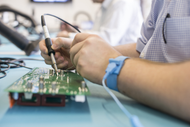Significance of IPC-7711/7721 Certification
Posted by Staff - Soldertraining on Jun 5th 2022
There are a plethora of programs and credentials available for anyone interested in working in the electronic manufacturing industry. In order to select the best IPC certification, you must first determine what you hope to learn. The IPC-7711 21 certification is an excellent option for experienced solder technicians who want to learn more about the process of setting up and reworking PCB electronic components.
Here, we'll go through the advantages of IPC certification, who could benefit most from it, and how to choose which 7711/7721 certification level is best for your requirements.
Who Requires IPC-7711/7721 Certification?
IPC-7711/7721 should not serve as an entry-level certification exam for hand soldering. Candidates for this certification should already be proficient in both through-hole and surface mount soldering and possess good hand/eye coordination with their toolkits.
This qualification is beneficial for supervisors or those aspiring to supervisory positions since it demonstrate that they can repair high-priced devices to their original manufacturer specifications or make extra alterations to them.
A knowledge-based test and demonstration of reworking and repair abilities and methodologies for electronic assemblies are prerequisites for IPC-7711/7721 certification.
In order to guarantee that you are capable of doing the task to the requisite high standards, enrolling in a class that includes practical experience is highly recommended. The training consists of step-by-step procedure instructions to expand on the information, skills, and abilities gained via earlier IPC certifications.
Topics Covered In Training Include:
● Product categories, skill levels, equipment, and resources.
● Component removal for surface and through-hole mounts.
● Layout and installation of building components on the site.
● Methods of primary heating: conduction, convection, etc.
● Assembling electrical components and systems.
● Detailed instructions on how to splice wire.
● Removal and installation of components via through-hole methods.
● Rework processes utilizing the Chip and MELF architectures.
● Rework for SOIC/SOT, J-lead, and QFP.
● The restoration of the circuit and the lamination of a printed wiring board
● Removal of the conformal coating.
Who Needs to Become a Trainer?
Candidates for Certified IPC Trainer certification must have outstanding soldering abilities and the ability to convey knowledge. Obtaining this certification is highly recommended for supervisors in the fields of training, manufacturing, and quality assurance who have extensive expertise in these areas.
Advantages of Obtaining a Certification
When it relates to the regulation, assembling, and production requirements for electronic equipment and assemblies, the IPC is the gold standard in the field of soldering and electrical fabrication. As an IPC-certified soldering specialist, you'll have access to more jobs in the electronics manufacturing business.
Employers often look for IPC certificates as a sign that applicants have a thorough understanding of their profession and the ability to do tasks in accordance with industry standards.
Getting certified might directly influence your salary because of the incentives offered by various manufacturers. If you obtain instructor certification, you will be able to educate operators at a corporation, enhancing your chances of advancement to supervisor or management positions.

